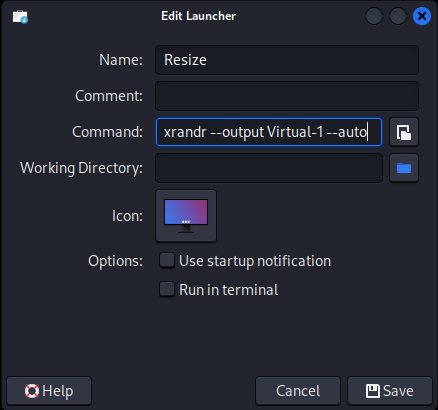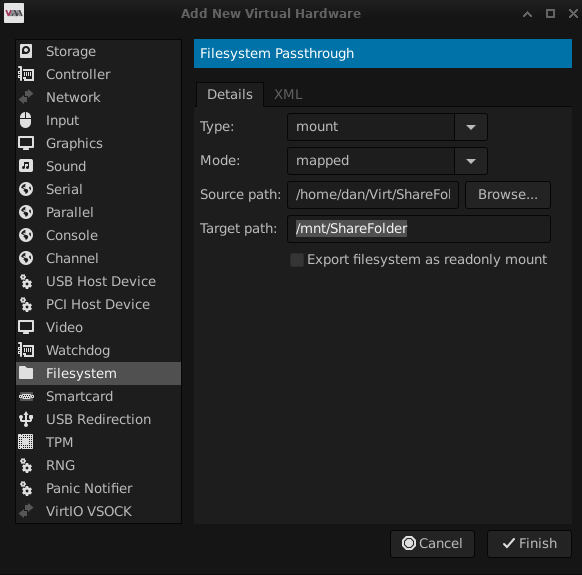Notes from running a KVM hypervisor on my laptop
Compress QCOW2 disks and reclaim free space
Thin-provisioned QCOW2 disks will grow in size as required. They do not automatically shrink. I had some disks with over 100GB allocated on their host and less than 10GB in the filesystem.
## If disk is not sparse already, this will convert the disk in place.
virt-sparsify --in-place Virt/kali.qcow2
## I have a small /tmp partition. Set a temporary temp directory
export TMPDIR=/home/dan/tmp
## Create a compressed disk. Could take a long time depending on disk size.
virt-sparsify --compress disk.qcow2 disk-compressed.qcow2
Resize VM to window running XFCE4
Auto resizing VMs running XFCE4 does not work.
Can trigger the resize with the following.
##Identify the virtual monitor name
xrandr --listmonitors
Monitors: 1
0: +*Virtual-1 1600/423x900/238+0+0 Virtual-1
## Trigger the resize
xrandr --output Virtual-1 --auto
In VMs running XFCE4 I like to create a launcher for this on my taskbar panel
 |
|---|
| XFCE4 Monitor Resize Launcher |
Problem saving running memory to disk
On my laptop, I have allocated 16GB to my /var partition. All of my VM disks are in my /home directory.
The problem is when you choose to “Save” a running VM, the virtual memory is written to disk at /var/lib/libvirt/qemu/save/
I have not found a way to change this default behavior.
CPU topology Hashcat benchmarks
All tests done with Skylake-Client-IBRS model and CPU security flaw mitigations disabled.
My laptop CPU is a Xeon E3-1505M.
1 Socket x 4 Cores
hashcat --benchmark
-------------------
* Hash-Mode 0 (MD5)
-------------------
Speed.#1.........: 294.1 MH/s (2.97ms) @ Accel:256 Loops:1024 Thr:1 Vec:8
---------------------------
* Hash-Mode 1400 (SHA2-256)
---------------------------
Speed.#1.........: 82801.3 kH/s (12.59ms) @ Accel:256 Loops:1024 Thr:1 Vec:8
-----------------------
* Hash-Mode 1000 (NTLM)
-----------------------
Speed.#1.........: 390.9 MH/s (2.49ms) @ Accel:256 Loops:1024 Thr:1 Vec:8
--------------------------------------------------------
* Hash-Mode 7500 (Kerberos 5, etype 23, AS-REQ Pre-Auth)
--------------------------------------------------------
Speed.#1.........: 1913.6 kH/s (68.26ms) @ Accel:32 Loops:1024 Thr:1 Vec:8
4 Sockets x 1 Core
hashcat --benchmark
-------------------
* Hash-Mode 0 (MD5)
-------------------
Speed.#1.........: 335.2 MH/s (2.97ms) @ Accel:256 Loops:1024 Thr:1 Vec:8
---------------------------
* Hash-Mode 1400 (SHA2-256)
---------------------------
Speed.#1.........: 87031.4 kH/s (11.87ms) @ Accel:256 Loops:1024 Thr:1 Vec:8
-----------------------
* Hash-Mode 1000 (NTLM)
-----------------------
Speed.#1.........: 539.8 MH/s (1.78ms) @ Accel:256 Loops:1024 Thr:1 Vec:8
--------------------------------------------------------
* Hash-Mode 7500 (Kerberos 5, etype 23, AS-REQ Pre-Auth)
--------------------------------------------------------
Speed.#1.........: 1925.9 kH/s (67.86ms) @ Accel:256 Loops:128 Thr:1 Vec:8
Results
There is a noticeable performance increase when choosing multiple sockets over multiple cores.
UEFI Firmware means no snapshots
Heading is really self explanatory. I learnt the hard way that VMs using UEFI firmware can not currently be snapshotted.
Mounting shared folders
First configure the filesystem passthrough in Virt-Manager
 |
|---|
| Virt-Manager Filesystem Passthrough |
Create a directory in the VM and mount
mkdir ShareFolder
sudo mount -t 9p -o trans=virtio /mnt/ShareFolder ShareFolder/